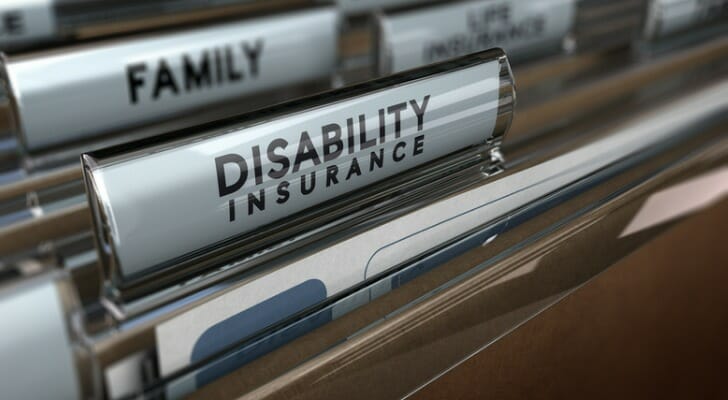With Shortminus term Disability ‹ Coverage Payments Will Continue to Age 65

Short-term disability insurance can temporarily replace your paychecks if you can't work because of an injury or illness. Some employers provide short-term disability insurance as an employee benefit but you can also purchase a policy on your own. But do you need short-term disability coverage? Ultimately, that's a question only you can answer based upon your needs and your overall financial situation. If you're thinking about getting short-term disability insurance, you may want to consider working with a financial advisor to see if it's right for you. SmartAsset's free advisor matching tool can help you find advisors that serve your area today.
What Is Short-Term Disability Insurance?
Short-term disability insurance is coverage that replaces a percentage of your income, typically 40% to 60%, if you have a temporary injury or illness that keeps you from working. This type of coverage is designed to pay benefits for a set time period, which can range from three to 12 months.
It isn't the same thing as workers' compensation coverage or long-term disability insurance. With workers' compensation benefits, you can receive payments for injuries or illnesses that happen on the job or are somehow work-related. Short-term disability insurance can cover you if you get sick or injured outside of work.
How Short-Term Disability Insurance Works
Short-term disability insurance works by paying benefits to you for qualifying events. If you become ill or are injured, you can file a claim with the insurance company that provides your policy. Once the claim is approved, you'd receive payments based on your income and the percentage of that income your policy pays.
There may be a minimum and maximum amount your policy will pay to you each month. For example, your policy might offer a minimum payment of $300 per month and a maximum payment of $3,000 monthly. There may be a waiting period of up to 30 days before benefits kick in after filing a claim.
If you have your plan through work these benefits are paid by the insurance company, not your employer. In some states, including California and New York, employers are required to provide short-term disability coverage to their employees. But in others, it's optional so if your employer doesn't offer it you could purchase a policy yourself through a disability insurance company.
What Does Short-Term Disability Insurance Cover?

Short-term disability coverage applies to medical conditions that prevent you from working temporarily. Again, this typically doesn't extend to workplace injuries as those would be covered by workers' compensation insurance.
Some of the reasons for filing a short-term disability claim can include:
- Pregnancy and parental leave
- Post-surgical rehabilitation
- Extended illness
- Accidental injuries
Covered events are policy-specific, meaning that what you can claim short-term disability benefits for is determined by the terms of the policy. Some policies, for instance, may cover time away from work for mental health issues. But policies may exclude coverage for preexisting conditions, intentional injuries or injuries that occurred while carrying out a criminal act.
Short-term disability insurance also excludes time away from work to care for a sick or injured family member. You can, however, take up to 12 weeks of unpaid leave from work under the Family and Medical Leave Act (FMLA). Your employer can't fire you for exercising your FMLA benefits but there's no requirement that you have to be paid during your time away.
Short-Term Disability Insurance vs. Long-Term Disability Insurance
Long-term disability insurance offers income replacement for injuries or illnesses that prevent you from working for more than a few months. The main differences between short-term and long-term disability insurance are how much the policy pays, what events are covered and how long you can receive benefits.
Some of the situations that may be covered by long term disability insurance include:
- Pregnancy and parental leave
- Cancer treatment
- Absences related to mental health issues
- Injuries that require a longer recovery period
Instead of receiving benefits equal to 40% to 60% of your income, long-term disability insurance may pay anywhere from 60% to 80% of your income. Depending on how the policy is structured, you may be able to collect payments for up to 10 years or up to age 65.
Long-term disability insurance may be offered through your employer as part of group coverage. Or you could purchase a long-term disability policy on your own if you don't have this employee benefit.
Who Needs Short-Term Disability Insurance?
Short-term disability insurance can be a valuable benefit to have if you're concerned about an injury or illness preventing you from earning an income temporarily. If you don't have this benefit through your job, it may be worthwhile to purchase coverage if you're the primary breadwinner for your family or you're a single person with no other income sources.
The upside is that short-term disability insurance tends to be affordable. Factors that affect the cost of your policy include:
- Your income and how much of your income the policy will replace
- Benefit term and how long you'd like to be able to receive payments if necessary
- The waiting period, which is the window of time you have to wait before benefits are paid once you become temporarily disabled
The more income the policy needs to replace, the longer it needs to pay benefits and the shorter the waiting period is, the more a short-term disability insurance policy will cost. But it's still possible to purchase coverage for under $100 a month. Getting insurance quotes online from multiple short-term disability providers can help you find a policy that's affordable and offers the type of coverage you need.
Bottom Line

Short-term disability insurance can help you avoid depleting your emergency fund if you're not able to work temporarily. And if you don't have an emergency fund yet, you can use short-term disability benefits to stay afloat until you can return to work. If you're curious whether you have these benefits, you can contact your HR administrator or benefits coordinator to see what coverage, if any, is covered. And if you'd like to purchase coverage yourself, you can get the process started online.
Insurance Planning Tips
- Consider talking to a financial advisor about whether it makes sense to purchase short-term disability coverage. Finding a qualified financial advisor doesn't have to be hard. SmartAsset's free tool matches you with up to three financial advisors who serve your area, and you can interview your advisor matches at no cost to decide which one is right for you. If you're ready to find an advisor who can help you achieve your financial goals, get started now.
- When applying for short-term disability insurance, keep in mind that you may need to fill out a health questionnaire. If you're denied a policy because of a preexisting condition, the next best option may be to work on increasing the size of your emergency savings to help cover any temporary work absences. A high-yield savings account at an online bank could be a good choice for holding these funds.
Photo credit: ©iStock.com/Pheelings Media, ©iStock.com/olm26250, ©iStock.com/Chinnapong
Source: https://smartasset.com/insurance/short-term-disability-insurance
0 Response to "With Shortminus term Disability ‹ Coverage Payments Will Continue to Age 65"
Post a Comment